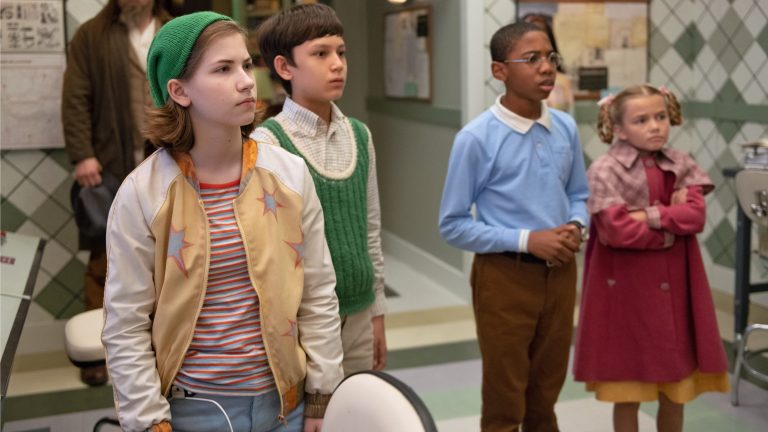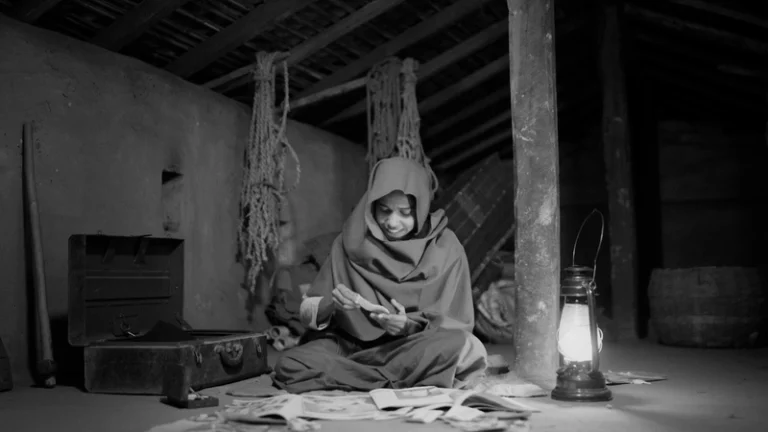Episode 9 of The Patient had a huge altruistic revelation for the viewers. It confirmed a theory that has been doing the rounds in our minds since episode 5. While the twist is not tangible, it is a refreshing change from the straightforward stories we have seen for so long. In this episode, we see Alan have an Epiphanius nightmare that wakens an old lesson from his studies. Sam meets a familiar face as he hopes to begin anew. However, the culmination of things does not bring us closure, as we will have to wait for episode 10, the finale, next week to get a sense of what actually happened here. Here is our recap and ending explainer for episode 9 of The Patient’s season 1.
The Patient, Episode 9 “Auschwitz” Recap
The very first sight we see in episode 9 of The Patient, titled “Auschwitz,” is the infamous, vile thing that exists in history as a blemish. Alan walks through the barbed wire fencing in the Auschwitz concentration camp and heads toward the place where they keep all the inmates. The visual tone is a macabre black and white. It is the kind of presentation that would raise the hair at the back of your neck. Once Alan is in, we can almost see and hear their minds’ cries, helplessness, and terror. The therapist walks up to a man and wakes him. Suddenly, he says, “Not to wake the person up,” after Alan first said, “Viktor. You were in a nightmare”.
That person could just as easily be Alan himself. His entire life is a nightmare without end. He wakes up with the shock of what he saw in his nightmare. He turns to his nightstand and keeps his fungal foot cream on it. It is perhaps the only thing that is truly his own. Another connotation from the last two episodes is that it might be something he uses to summon Charlie in his head for “his therapy” sessions. But in episode 9, we indeed come to terms with the depths of this motif. Alan has been continuously scraping the sharper end of the tube to make it into a half-edged knife to kill or injure Sam.
When Alan meets with Charlie, he suggests perhaps he could use that tube and do the above. But Charlie seems dismissive of the idea and more interested in Alan’s dream. The man in question is Viktor Frankl, an Austrian psychiatrist who founded logotherapy, a school of psychotherapy that describes a search for a life’s meaning as the central human motivational force. Logotherapy is part of existential and humanistic psychology theories. Frankl was a Holocaust survivor, and his most famous book, which Charlie and he himself referred to, was Man’s Search for Meaning. Charlie interprets the incident as a message that the human spirit can prevail over anything. Despite Alan’s dire circumstances, he must continue to remain a therapist and true to himself.
Alan calls out to Sam, who is in his room. It seems like the dream has impacted him in some way. He is making a case to his captor not to kill him and by possibly delaying what is looking like the inevitable, chance fate for a way out. Any way would work, and the therapist would finally be free. Alan says he does not want Sam to see Mr. Buchella next week and continue working with him. “Things get worse before they get better” is what Alan says to Sam while explaining that he has done a decent job of listening to and getting better than before. Even though it does seem like their sessions have worked, Sam must keep working. Sam certainly understands partly why Alan would say something like this. A new therapist would mean that the old one is of no use to him now. Coupled that with the fact that he would have been a former prisoner of Sam’s when he releases him, he can not let him go. A week is all Alan has got to do something about this psychopathic killer or else bear the same fate as Elias and Kyle. The status quo has remained.
Alan still suggests that they should not stop working and send him off in the best shape, top Buchella. Their next session will be on Frankl’s biggest learnings. He mentions about the book and how we all need meaning in our lives more than anything else. The way they manifest it is through making relationships with other people. Friends, family, and romance are a few ways we find something to get us going in life. Sam is confused. He felt the same way he is feeling now – angry and lost in the dark – when he was with Mary. Alan says Sam would have felt differently if they were still together. Sam says he is awkward with women but fell in love with Mary, his mother’s physical therapist, when she broke her wrist. Maybe, he is not so bad after all with them. The reason she left him, he explains, was that she was not sure if he “loved” loved her. She was always doubtful if he was fully committed to the relationship and did not feel reciprocation from him.
Mary used to long for Hara, the child they adopted from Bangladesh, and imagine all of them together in bed. Sam says his wife used to complain all the time; maybe, she didn’t have enough meaning in her life. Alan says meeting her and seeing them together would enable him to predict much better about what would or wouldn’t work. He suggests using a nanny cam, although Sam suggests it wouldn’t be “honest” for them to do this, but he himself is desperate. He agrees to bring her over for brunch and calls down Candance. Sam has already texted her, and Candace is confused about why it is Mary and not another girl. The mother comes down and is skeptical about the idea. Alan tries to explain his thesis, and, in the meanwhile, Mary texts back, saying she will come for brunch. Charlie reminds Alan of his moral duty to Mary in this case. If Alan tries to go ahead with his plan, she will lose her life if something goes wrong.
Sam or Candace would be on her in a blink and ensure she never gets out. Elias was not his fault, but Alan did have something to do with it. Sam alludes to this very point by Charlie when he sets up the nanny cam and anticipates Mary’s arrival. He warns Alan not to create a situation where he “will be forced to do something he normally would not do.” Alan nods in agreement and secretly hides the tube of cream in his left hand. For food, Alan asks Sam to switch the Indian he has brought from Maruti for something that Mary would like. Indian food gives her gas, and Sam agrees with the therapist. Sam is still very nervy about meeting her and dummies a conversation with Alan. We see him struggle in real time as he has no idea what to say to her. But why this nervousness? In episode 5m when he visits his ex-wife at her house, he was not as strange. Why is he suddenly so uncomfortable now?
Does he think he has a chance with her to get back together? Is that why he is sweating about the brunch? We will find out. Asking questions is key, Alan reminds Sam as he goes out to the front. Alan anticipates that he will need his full strength to execute his plan and even does push-ups to get back into some physical groove. Mary arrives for brunch, and the pair is a little cold. Candace, too, sits with them at the table but watches on as Alan does on the cam. Mary likes that Sam got her favorite food. Sam is mostly quiet as they begin eating. Sam tries to recite Alan’s jew joke from episode 8’s ending to break off the stiffness. But naturally, because he is so nervous, he butchers it. The joke is messed up, and Alan watches in disappointment. I wonder if it was the Michael Scott in him that was reacting to this. Sa excuses himself and comes down to Alan for help. He sits down very close to him, and his attention is diverted by the camera, where he is ruminating if he has messed up his opportunity. This is the perfect moment for Alan to kill him with the tube. As he contemplates this, he is reminded of Charlie’s words that he would be responsible for Mary if he did something like this.
It is a really tense mood where Alan almost goes for the kill, but it does not actually happen. Aam goes back up, and Alan’s situation does not change. Sam can naturally have a normal conversation with Mary for a couple of seconds, who responds as an average person would o without any signs of hatred for Sam. Candace inadvertently mentions that the chair Mary wants back belonged to Sam’s father and the inspector gets unsettled. He abruptly gets up, and the brunch ends. Candance cleans up as Sam drops Mary off. He comes into the house with a disgruntled look on his face. “Mary said it would be good if they could be friendly and meet once a year like this.” And then he drops the bomb that he wants to get back together with her. But what would have given him that indication? Why is he being delusional like this? He is sad and angry toward Alan for pushing him into this situation. Alan explains that to make meaningful relationships, one must be courageous, take risks, and when it does not come off, you feel hurt. That is exactly what Sam feels right now.
The Patient, Episode 9 Ending, Explained
Sam is even firmer in his decision now. He will go to Buchella the next week and is confident he will do a better job. Alan asks him to be honest about what his father did to him with Buchella. Sam is taken aback a bit, and things get serious. Alan feels Sam has not yet accessed his deepest feelings and memories about his father. That is why he is still struggling to get insights into what is actually wrong with him. As Alan has diagnosed before, Sam is taking out the anger of his father’s behavior on other people. Sam would kill his father “instead,” and that is what he is doing to other people if he could. Something of a tube light goes off in Sam’s mind when he enters the bedroom and brings his laptop. He shows Ed Kemper’s interview to Alan. This is the serial killer featured in the Netflix series Mindhunter.
Sam sets out to kill his father and cut his head off after he sees Kemper admit that his anger at his mother subsided when he killed her. The storm that brewed within was finally calm after he “cut her head off and f*cked it.” Alan looks at him ghastly, but Sam’s mind has already been made up.
This is how the slightest thing can upset the larger balance of things. As we go into the final episode of The Patient, it is, in fact, someone who hasn’t been featured at all and who is in danger. The ending of episode 9 of The Patient confirms the theory that has troubled us since the episode “Charlie.” The title of the show refers to Alan and not Sam. Despite the many attempts to convince us that Sam was the patient who needed help, it was, in fact, Alan. Sam was a red herring all along. He was the “entertainment” creators often need to make a story about difficult truths of someone’s life more palatable for the audience. You can’t even imagine yourself watching the show without the setup of Alan being kidnapped by Sam. It would have been too boring. So, the final episode is in a week, and the question remains: who will prevail? Will it be Sam’s abusive father who will get away by killing his son – as he has always wanted – or will it be the son who will finally get his revenge?





![Changeling [2008]: Conventional but Captivating](https://79468c92.delivery.rocketcdn.me/wp-content/uploads/2018/05/Changeling_HOF-768x432.jpg)


